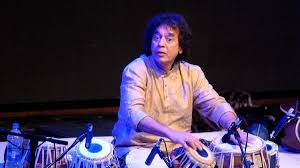
Tabla maestro Ustad Zakir Hussain, celebrated globally for his “dancing fingers” and unmatched artistry, passed away early Monday at the age of 73 in a San Francisco hospital. According to his family, he succumbed to complications arising from a chronic lung disease.
“He leaves behind an extraordinary legacy cherished by countless music lovers around the globe, with an influence that will resonate for generations to come,” his family said in a statement.
Hussain had been hospitalized for two weeks and was in intensive care before his condition deteriorated. His sister, Khurshid Aulia, shared that the legendary musician passed away “very peacefully.”
A Prodigy and a Pioneer
Born on March 9, 1951, Zakir Hussain was the eldest son of tabla maestro Ustad Alla Rakha. A child prodigy, he began his professional career at the tender age of 12, accompanying Indian classical musicians. By the age of 18, Hussain was performing on international stages, captivating audiences with his mesmerizing performances and innovative collaborations.
His ability to bridge traditional Indian classical music with global sounds brought tabla to the forefront of world music. Hussain’s groundbreaking projects, including Shakti, Remember Shakti, Masters of Percussion, Planet Drum, and Tabla Beat Science, showcased his genius for collaboration and elevated the status of Indian percussion worldwide.
In addition to his contributions to Indian classical music, Zakir Hussain worked with some of the greatest musicians across genres. Notable collaborators included George Harrison of The Beatles, cellist Yo-Yo Ma, and jazz legend Herbie Hancock, making him a true ambassador of Indian music on the global stage.
A Legacy of Excellence
Zakir Hussain received numerous accolades during his lifetime, including the Sangeet Natak Akademi Award, India’s highest honor for performing artists, in 2019. Earlier this year, he made history as the first Indian musician to win three Grammy Awards in a single year, for Best Global Music Album, Best Global Music Performance, and Best Contemporary Instrumental Album.
His mastery of the tabla was unparalleled, and his efforts to create dialogues between North and South Indian musical traditions further enriched the global appreciation of Indian music.
Tributes Pour In
Messages of grief and admiration have been flooding social media as fans, musicians, and artists across the world mourn his passing. Sarod maestro Amjad Ali Khan expressed his sorrow on X (formerly Twitter), writing, “Words fail me at this point. I am completely heartbroken and devastated to hear about Zakir Bhai. Ustad Zakir Hussain was a phenomenon. He was indeed one of the most loved musicians the world saw.”
In his final social media post, shared in October, Hussain captured the beauty of fall in the US, reflecting on the graceful sway of trees changing colors. “So beautiful to watch… The movement is so graceful, so unbelievable. I wanna walk out here…”
The End of an Era
Zakir Hussain’s passing marks the end of an era in music. From his child prodigy days to becoming a global icon, Hussain’s journey was one of dedication, innovation, and artistic brilliance.
He leaves behind an indelible legacy that will continue to inspire generations of musicians and music lovers worldwide.
Sources By Agencies


